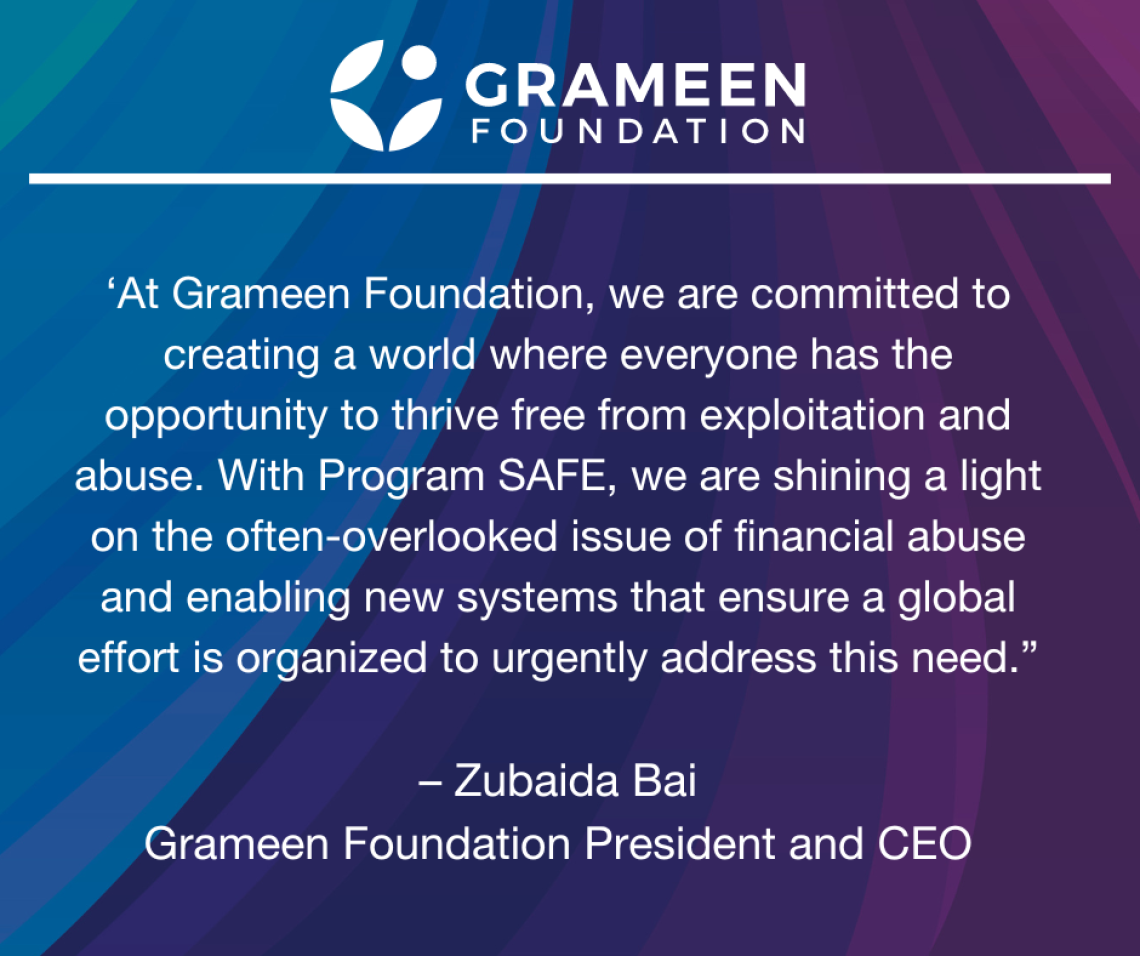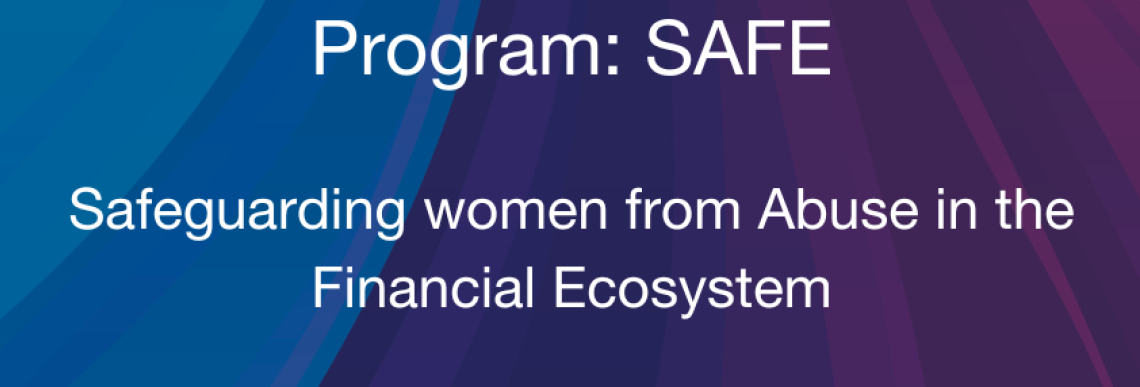Make your 2X MATCHED gift today!
This week only: Every $1 will be matched with $2 to enable women worldwide.
This week only: Every $1 will be matched with $2 to enable women worldwide.
Posted on 05/30/2024
Part Two In Our Program SAFE Blog Series
In our first blog, our CEO Zubaida Bai announced the purpose of Program SAFE, which stands for Safeguarding women from Abuse in the Financial Ecosystem and is a comprehensive strategy aimed at raising awareness, developing tools and standards, and building a global coalition to safeguard against financial abuse in all its forms. At Grameen Foundation, our decades-long work has always centered on the financial inclusion of women into their local economies as the fastest way to end poverty in our lifetime. But many systemic barriers limit her access to finance, one of the most important of which is learned gender norms.
As Antonique Koning of CGAP wrote in recent research, “To advance women’s financial inclusion and economic empowerment, funders and market facilitators need to acknowledge gender norms and understand how they limit women’s ability to access, use, and benefit from financial services. Ignoring gender norms can limit the effectiveness and impact of financial inclusion interventions, and in some cases, ‘gender-neutral’ approaches can even have unintended negative consequences.”
A recent project Grameen facilitated in Honduras highlighted how deeply entrenched gender norms lead to financial abuse and result in normalized abusive behavior. It's assumed that men are the breadwinners and are solely responsible for the household financial decisions. Women, therefore, do not think twice about handing over their financial power to their partner for this reason. This sort of “relationship” with money is expected. Women in Honduras are not alone. Unconscious financial abuse happens everywhere, in high- and low-income countries alike.

Globally, women are twice as likely as men to experience economic abuse. In the UK, for example, 1 in 5 women face economic abuse. In Ghana, it is the most reported form of abuse. Depending on the research methods, statistics will show a range between 5% and 100% experiencing some form of economic or financial abuse, with 100% representing women who have left abusive partners and are interviewed in women’s shelters. 7 out of 8 women who leave an abusive partner or family leave behind assets and property. In Australia, it was estimated that this results in a woman’s income dropping by 34%. The financial consequences of leaving an abusive relationship can therefore be devastating.
Our early research testing out an economic coercion scale with our partner in Honduras, ODEF Financiera, revealed that 35% of the women shared that their partner had kept information on household finances and assets from them in the prior 12 months, 31% had been prevented from attending a training, and 24% of the women’s partners had demanded to know where they had spent their own money. These statistics are not surprising when national data indicates that 5 in 10 women in Honduras reported experiencing economic violence and 16% of women have experienced either psychological, physical or sexual violence in the past year.
When ODEF conducted Grameen’s Resilient Life Resilient Business (RLRB) curriculum with their female clients, which included a session on gender-based violence (GBV), women shared the below afterward.
As these quotes suggest, a simple session facilitated by a financial service provider can help raise awareness of financial abuse but our experience shows that more action is required and it’s necessary to follow up this awareness-raising with support from her ecosystem. It’s crucial that support is enabled across all levels of a woman’s life to help prevent financial abuse, respond to it when it occurs, and then help women recover from it when it has occurred. We believe when you can change financial systems to protect women from financial abuse, this will also serve to change financial systems to protect other vulnerable and marginalized groups, such as the elderly and youth of any gender.
Until we are able to completely reframe the role of gender in local economies and dismantle harmful gender norms across the globe, financial abuse of women and marginalized communities will continue. Even if a woman has unknowingly or knowingly handed over her financial power to another family member, it’s crucial that we enable systems that balance power equally for families, and ensure conscious and unconscious financial abuse ends for all.
In our next blog, we’ll outline what we see as practical steps FSPs can take to respond to the threats and consequences of financial abuse.

Additional Resources:
Fitzpatrick C. 2022. Designed to Disrupt: Reimagining banking products to improve financial safety. CWES Discussion Paper. Centre for Women’s Economic Safety. https://cwes.org.au/wp-content/uploads/2022/11/CWES_DesigntoDisrupt_1_Banking.pdf
Sharp-Jeffs N. 2015. Money Matters: Research into the extent and nature of financial abuse within intimate partner relationships in the UK. Refuge and The Cooperative Bank. https://repository.londonmet.ac.uk/1481/1/Money-Matters.pdf
Johnson L, Chen Y, Stylianou A. et al. 2022. Examining the impact of economic abuse on survivors of intimate partner violence: a scoping review. BMC Public Health 22, 1014. https://doi.org/10.1186/s12889-022-13297-4 and Royal K and Wilson-Garwodd R. Economic abuse: A global perspective. Findings on the prevalence and nature of economic abuse, and responses to it. Surviving Economic Abuse (SEA). Surviving Economic Abuse (SEA) and Nduka C, Omuemu V, Tella A, Obi D. 2023. Economic Abuse as a Form of Intimate Partner Violence in Sub-Saharan Africa: A Review of the Literature. Journal of Community Medicine and Primary Health Care 35: 3. Journal of Community Medicine and Primary Health Care 35: 3 and Postmus JL, Plummer SB, McMahon S, Murshid NS, Kim MS. 2012. Understanding economic abuse in the lives of survivors. J Interpers Violence. 2012 Feb;27(3):411-30. doi: 10.1177/0886260511421669. Epub 2011 Oct 10. PMID: 21987509.
Johnson, L., Chen, Y., Stylianou, A. et al. Examining the impact of economic abuse on survivors of intimate partner violence: a scoping review. BMC Public Health 22, 1014 (2022). Examining the impact of economic abuse on survivors of intimate partner violence.
Cameron P. 2014. Relationship problems and money: women talk about financial abuse. WIRE Women’s Information, West Melbourne. WIRE Women’s Information, West Melbourne and Fitzpatrick C. 2022. Designed to Disrupt: Reimagining banking products to improve financial safety. CWES Discussion Paper. Centre for Women’s Economic Safety. Centre for Women’s Economic Safety
República de Honduras. 2019. Encuesta Nacional de Demografía y Salud / Encuesta de Indicadores Múltiples por Conglomerados. Honduras 2019.; UN. 2022. Estudio de Tolerancia Social e Institucional de la Violencia hacia Mujeres, Niñas y Adolescentes en Honduras.
Paper-based curriculum can be found here: https://www.wageglobal.org/training-guides.html